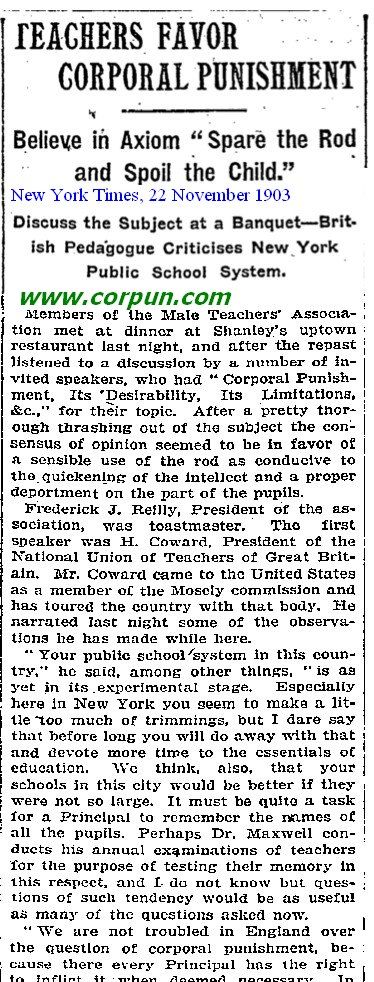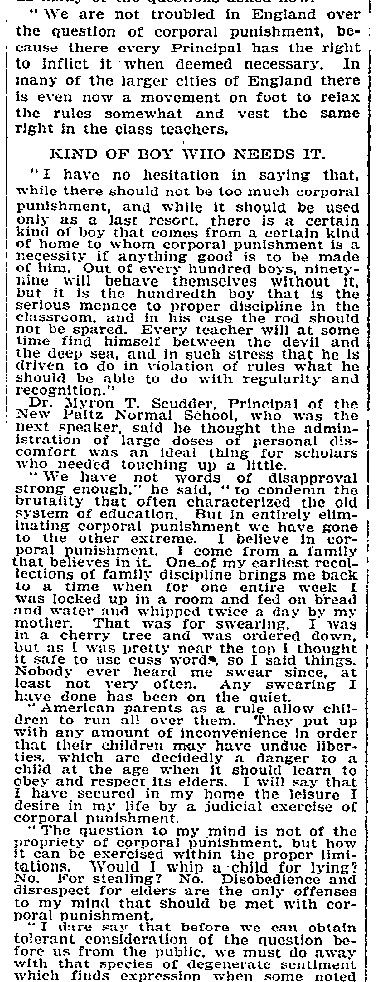|
Corpun file 19670

The New York Times, 22 November 1903
Teachers Favor Corporal Punishment
Believe in Axiom "Spare the Rod and Spoil the Child."
Discuss the Subject at a Banquet -- British Pedagogue
Criticises New York Public School System.

Click to enlarge |
Members of the Male Teachers' Association met at dinner at Shanley's uptown
restaurant last night, and after the repast listened to a
discussion by a number of invited speakers, who had
"Corporal Punishment, Its Desirability, Its Limitations,
&c.," for their topic. After a pretty thorough thrashing
out of the subject the consensus of opinion seemed to be in favor
of a sensible use of the rod as conducive to the quickening of
the intellect and a proper deportment on the part of the pupils.
Frederick J. Reilly, President of the association, was
toastmaster. The first speaker was H. Coward, President of the
National Union of Teachers of Great Britain. Mr. Coward came to
the United States as a member of the Mosely commission and has
toured the country with that body. He narrated last night some of
the observations he has made while here.
"Your public school system in this country," he said,
among other things, "is as yet in its experimental stage.
Especially here in New York you seem to make a little too much of
trimmings, but I dare say that before long you will do away with
that and devote more time to the essentials of education. We
think, also, that your schools in this city would be better if
they were not so large. It must be quite a task for a Principal
to remember the names of all the pupils. Perhaps Dr. Maxwell
conducts his annual examinations of teachers for the purpose of
testing their memory in this respect, and I do not know but
questions of such tendency would be as useful as many of the
questions asked now.
"We are not troubled in England over the question of
corporal punishment, because there every Principal has the right
to inflict it when deemed necessary. In many of the larger cities
of England, there is even now a movement on foot to relax the
rules somewhat and vest the same right in the class teachers.
Kind of Boy Who Needs It.
I have no hesitation in saying that, while there should not be
too much corporal punishment, and while it should be used only as
a last resort, there is a certain kind of boy that comes from a
certain kind of home to whom corporal punishment is a necessity
if anything good is to be made of him. Out of every hundred boys,
ninety-nine will behave themselves without it, but it is the
hundredth boy that is the serious menace to proper discipline in
the classroom, and in his case, the rod should not be spared.
Every teacher will at some time find himself between the devil
and the deep sea, and in such stress that he is driven to do in
violation of rules what he should be able to do with regularity
and recognition."

Click to enlarge |
Dr. Myron T. Scudder, Principal of the New Paltz Normal School,
who was the next speaker, said he thought the administration of
large doses of personal discomfort was an ideal thing for
scholars who needed touching up a little.
"We have not words of disapproval strong enough," he
said, "to condemn the brutality that often characterized the
old system of education. But in entirely eliminating corporal
punishment we have gone to the other extreme. I believe in
corporal punishment. I come from a family that believes in it.
One of my earliest recollections of family discipline brings me
back to a time when for one entire week I was locked up in a room
and fed on bread and water and whipped twice a day by my mother.
That was for swearing. I was in a cherry tree and was ordered
down, but as I was pretty near the top, I thought it was safe to
use cuss words, so I said things. Nobody ever heard me swear
since, at least not very often. Any swearing I have done has been
on the quiet.
"American parents as a rule allow children to run all over
them. They put up with any amount of inconvenience in order that
their children may have undue liberties, which are decidedly a
danger to a child at the age when it should learn to obey and
respect its elders. I will say that I have secured in my home the
leisure I desire in my life by a judicial exercise of corporal
punishment.
"The question to my mind is not of the propriety of corporal
punishment, but how it can be exercised within the proper
limitations. Would I whip a child for lying? No. For stealing?
No. Disobedience and disrespect for elders are the only offenses
to my mind that should be met with corporal punishment.
"I dare say that before we can obtain tolerant consideration
of the question before us from the public, we must do away with
the species of degenerate sentiment which finds expression when
some noted criminal is going to be executed, and he is being
showered with flowers, loving messages, and gifts. We have
slidden into the slough of mawkish sentiment about this thing,
but the question is one that must be settled and be settled soon,
and you are the people to do it. The rule of the Board of
Education forbidding corporal punishment is one that not only
adds to the turbulence in many schools, but it makes law-breakers
of many teachers as well, and for that reason you should see to
it that it is withdrawn."
Dr. Bernard Cronson, Principal of Public School No. 125, who
recently presented a petition to the Board of Education on behalf
of the Male Principals' Association to restore to teachers the
right to inflict corporal punishment on refractory children,
spoke in a vein of satire of the difficult plight of many
teachers under the present restrictions in that regard.
"If you are tormented and your children are contaminated by
a wicked boy and you cannot take it out of his hide, you can at
least call the police if you are an ordinary mortal. And that is
only right. But you are not an ordinary man, but a teacher. And
as a teacher what can you do?
What Philosophers Advise.

Click to enlarge |
"Well, if you look up the philosophers on the matter you
will find that you can first tell that boy that the Articles of
Confederation were of no use because they could not be enforced.
If that does not help, you can impress upon his mind, and not
with any unnecessary harshness, mind you, that there are such
things as chain gangs and prisons and electric chairs for
grown-up people that are bad. If that fails, then what can you
do? Well, the philosophers will tell you, you must exercise your
sweet personality. You must try to charm him into being good.
"Now, I have a friend who is somewhat of a humorist. He
happens to have a son. One time the son came and asked his
humorous father for a nickel to buy soda. 'Why soda?' said the
father. 'I am thirsty,' said the boy. Well, this humorous father
replied 'If you were an ordinary boy that would be all right. But
you are my son. Go and quench your thirst without drinking.'
Now, I must confess that kind of humor is a trifle too pedagogic
for me. But then there are some other things I cannot grasp. I
cannot understand how anybody out of Eden can dress himself
without clothes, nor how any one could sneeze without a nasal
appendage, nor how you can correct a boy with the articles of
confederation. Nor do I understand how it is going to make an
incorrigible boy good to parole him in the custody of an aged
female missionary. And yet there is a higher power than the Board
of Superintendents and higher even than the Board of
Commissioners, and that power requires of you that you make that
bad boy a moral being."
"Love, moral suasion and the Ten Commandments," said
Dr. P. David Schultz, a physician, who next spoke, "are all
right, but let me tell you -- these little fellows in our class
will control the situation every time if you have not the right
to inflict corporal punishment on them. If you have the right I
do not think you would be called upon very often to use it, but
it is important that you should have it and that the boys should
know it."
Mr. Ossian Lang, editor of The School Journal, who was the last
speaker of the evening, said he was in favor of having the right
to inflict corporal punishment vested in male but not in female
teachers. He said in his observation there were certain days
when, under a female teacher, the boys were worse behaved than on
others, and that their bad behavior was largely due to the
teachers' irritability.
| |
About this website
Search this site
Article: American school paddling
External links: Corporal punishment in US schools
Archive up to 1975: USA
Video clips
Picture index
|

![]()